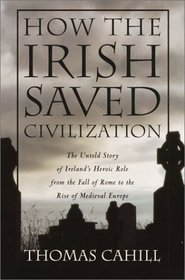Helpful Score: 10
Fascinating and interesting book that brings out the contribution of the early Medieval Irish to preserving the classical period of Greek and Rome. A great read for anyone interested in history and presented in an open clear fashion. Has a number of new ideas at least as far as I am concerned and I have studied the middle ages for decades.
Helpful Score: 6
A wonderful telling of Ireland's part in keeping the writings of antiquity from disappearing, from the collapse of the Roman Empire to the middle ages. The first of the "Hinges of History" series, makes me wish my history teachers had been as captivating as Cahill.
Mary Ann P. (MaryAnn1228) reviewed How the Irish Saved Civilization (Hinges of History) on + 39 more book reviews
Helpful Score: 4
Very easy and informative read. Raised catholic of irish heritage, even in my religious wanderings I have had a sense of grounding and pride in those roots. Now I know why. The information ties celtic myth to religious practices of today, and provides insight into the why deep multi layered old sacred tradition survives in Ireland today.
Helpful Score: 2
A high quality paperback, very interesting. Cahill proposes that much of the thought and writings foundational to Western civilization were saved from extinction during the dark ages by the dedication of monks, primarily Irish.
Jim R. (JIMB01) reviewed How the Irish Saved Civilization (Hinges of History) on + 11 more book reviews
Helpful Score: 1
If you love the Irish you will thrill at the reading of this book.Its a treasure!




